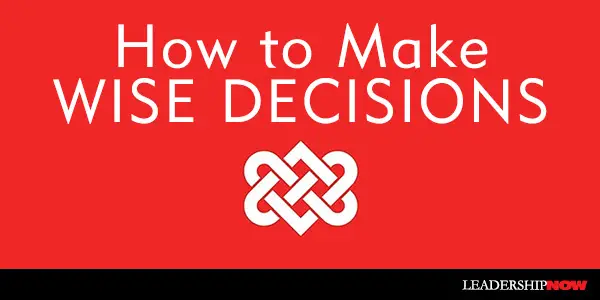 |
 |
04.08.24

How to Make Wise Decisions
WE ALL MAKE bad or certainly less-than-stellar decisions for any number of reasons. Sometimes, there are too many options to choose from. Or, conversely, we don’t bother to explore other options than the ones in front of us. We easily create narratives to fit our interpretation of reality, cherry-picking the information that gets us what we want. And these are just the more common challenges we face. So, what do we do? In Wise Decisions, Jim Loehr and Sheila Ohlsson take us through some science-based approaches to help us make better choices. The starting point for good decision-making is perhaps obvious but easily overlooked and ignored, especially amid the rush of life. Our health is the foundation for good decision-making. Our holistic health—mental, physical, emotional, and spiritual—is the vital starting point for sound, thoughtful, and measured decision-making. We simply cannot take in, consider, and thoughtfully process multiple streams of relevant information, both tangible and intangible, when we are anxious, depressed, sleep-deprived, sedentary, isolated, and self-medicating with wine and M&Ms! Good decision-making is a process of reflecting and responding rather than reacting. We all hear something that can be vital to making good choices, but it doesn’t always get through. We block it. Inside of us, we have a gatekeeper who decides what gets through and what gets blocked. The authors call it our Y.O.D.A. – Your Own Decision Maker. To be your best advisor possible, Y.O.D.A. should be preloaded with critical life coordinates such as core values, beliefs, and purpose in life. Your own resident advisor holds the keys to extraordinary decision-making. Wise decision-making requires that we preload the control center in our brain our Y.O.D.A., with a complete grasp of who we want to be and what matters most to us. These values become the reference points that guide the decisions we make. Wisdom is the acquired ability to rise above the immediate demands and stresses of the moment; to make decisions that are grounded in transcendent values, core beliefs, and high ethical standards; and to achieve real and enduring perspective on the issues question. Those preloads need to be protected. There are always forces at work that can derail our thinking and compromise our choices. We must guard against corrupted input by reflectively analyzing and scrutinizing all information before letting it in to our control center. “When a belief is consistent with what we deeply want or need, we are less likely to scrutinize its authenticity.” We are not as rational as we think we are. Rather, we are “emotional creatures who have the capacity to be rational. Our emotions run the show in life, and our capacity for logical thinking serves to moderate the flow of emotion.” When we reflect, process, frame, and reframe life experiences work for us rather than against us, we keep our hands firmly on the proverbial cognitive steering wheel. And this is precisely how we maintain a sense of control when the storms of life are raging. What’s the mind is also real in the body at a molecular level, and the stories we tell ourselves can either help or harm our health and, hence, our decision-making capacity across life. Our emotions signal to us that something important requires our attention. It signals a need to pause and reflect. Should I act on them or not? “All emotions, whether we think of them as good or bad, are a fundamental part of being human. The goal is not to feel joy, inspiration, and happiness 24/7, but rather to identify all our emotions and to manage the resulting feelings in a way that way that enhances our overall health and well-being.” Stress, of course, has an impact on our ability to make sound decisions. Stress causes us to overthink and hyper-focus on the issue at hand. What we need is perspective. Without a view of the bigger picture, we often resort to poor thinking and behaviors that we rationally know don’t serve us well. Seeing only a sliver of the story, usually the bad part, too often results in a form of mental inflexibility and rigidity that can completely undermine our ability to make sound decisions. When stress levels are excessive, and we fail to buffer the stress with sufficient recovery, we tend to fall back on old and well-trodden behavioral paths. This happens because our narrow aperture simply doesn’t allow any other viable alternative to rise to the surface. During particularly stressful times, it is important to stay connected to others. And as stated above, we need to buffer stress with sufficient recovery or restore the energy consumed by the stress. The authors break down ways to do that: Balancing physical stress with recovery involves #healthy nutritional input, hydration, exercise, strategic movement, sleep, and intermittent periods of rest. The more our personal view of reality and the sorties we tell ourselves align with the world as it really is, the better the choices we will make. “When we fail to recognize that a piece of incoming data is faulty, the stories and beliefs and the decisions built upon that data will also be faulty. The stories we form in life, even those we consider foundational, perhaps even sacred, can be contaminated by biased data and faulty interpretation.” 
Posted by Michael McKinney at 12:17 PM
|
BUILD YOUR KNOWLEDGE


How to Do Your Start-Up Right STRAIGHT TALK FOR START-UPS 
Grow Your Leadership Skills NEW AND UPCOMING LEADERSHIP BOOKS 
Leadership Minute BITE-SIZE CONCEPTS YOU CAN CHEW ON 
Classic Leadership Books BOOKS TO READ BEFORE YOU LEAD |